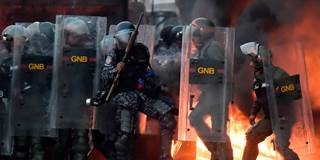When the United States chose to recognize Juan Guaidó as Venezuela’s president – along with a group of Latin American countries – and ban oil trade with the Maduro government, it was betting that the pressure would be sufficient to topple the regime quickly. So, now what?
NEW YORK – One month after Juan Guaidó, the speaker of Venezuela’s National Assembly, said he was assuming the powers of the Venezuelan presidency, currently held by Nicolás Maduro, the country’s political crisis remains far from over. Tensions have escalated to the point that a full-blown civil war – a seemingly implausible scenario just weeks ago – is now becoming increasingly possible. At least four people died and hundreds were injured in violent clashes at Venezuela’s borders last weekend as government forces opened fire on an attempt by the opposition to bring aid convoys into the country.
The Maduro regime is authoritarian, militarized, and ready to kill civilians to maintain power. The society is bitterly divided between the revolutionaries inspired by Hugo Chávez, Maduro’s predecessor, and a large and aggrieved opposition. Each side despises the other. The question is therefore a complex and practical one: what to do to help guide Venezuela away from civil war and toward a peaceful and democratic future?
On this great challenge, US President Donald Trump’s administration has gravely miscalculated. When the United States chose to recognize Guaidó as Venezuela’s president – along with a group of Latin American countries – and ban oil trade with the Maduro government, it was betting that the pressure would be sufficient to topple the regime. As a former senior US official told the Wall Street Journal, “they thought it was a 24-hour operation.”

NEW YORK – One month after Juan Guaidó, the speaker of Venezuela’s National Assembly, said he was assuming the powers of the Venezuelan presidency, currently held by Nicolás Maduro, the country’s political crisis remains far from over. Tensions have escalated to the point that a full-blown civil war – a seemingly implausible scenario just weeks ago – is now becoming increasingly possible. At least four people died and hundreds were injured in violent clashes at Venezuela’s borders last weekend as government forces opened fire on an attempt by the opposition to bring aid convoys into the country.
The Maduro regime is authoritarian, militarized, and ready to kill civilians to maintain power. The society is bitterly divided between the revolutionaries inspired by Hugo Chávez, Maduro’s predecessor, and a large and aggrieved opposition. Each side despises the other. The question is therefore a complex and practical one: what to do to help guide Venezuela away from civil war and toward a peaceful and democratic future?
On this great challenge, US President Donald Trump’s administration has gravely miscalculated. When the United States chose to recognize Guaidó as Venezuela’s president – along with a group of Latin American countries – and ban oil trade with the Maduro government, it was betting that the pressure would be sufficient to topple the regime. As a former senior US official told the Wall Street Journal, “they thought it was a 24-hour operation.”